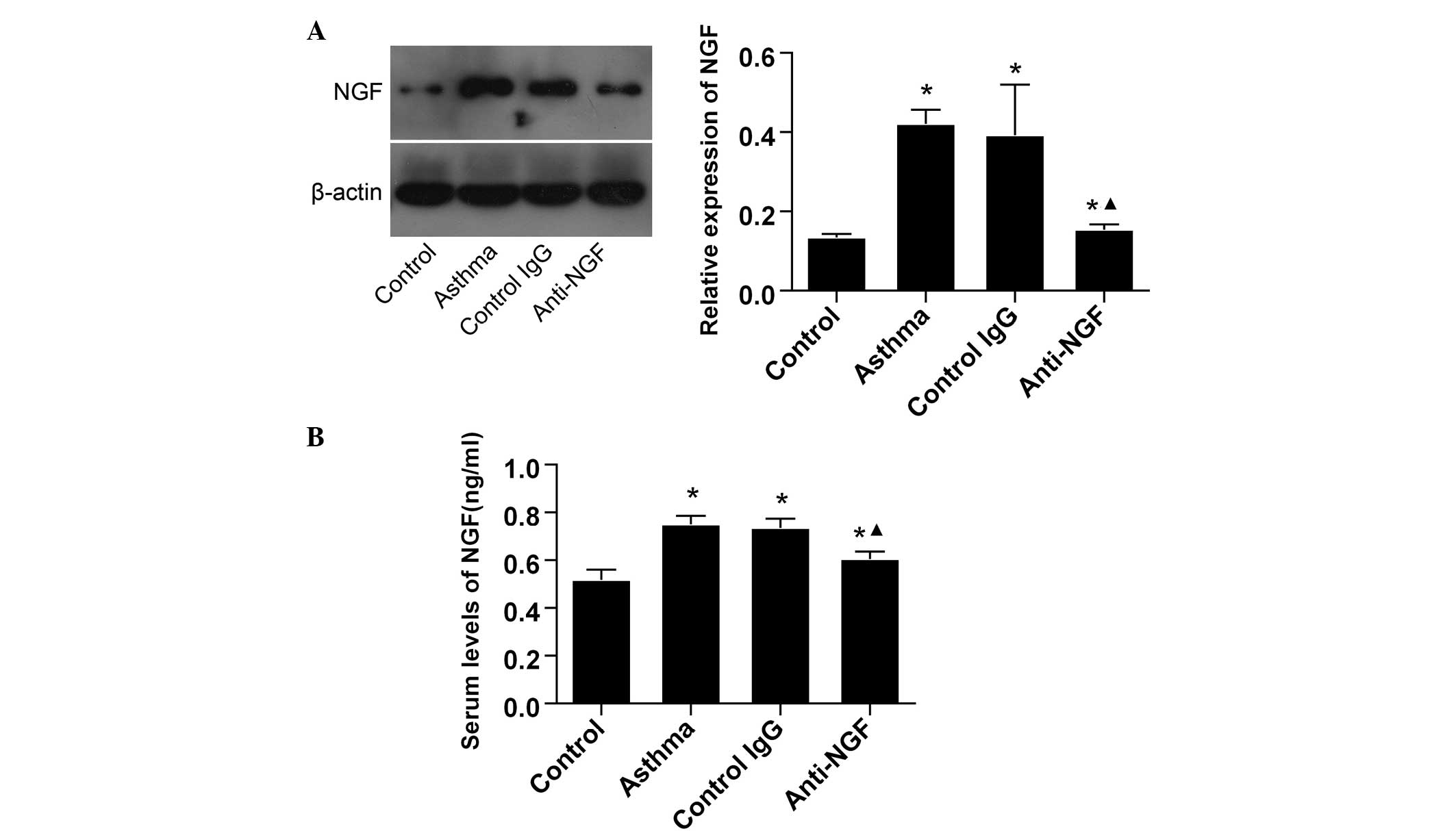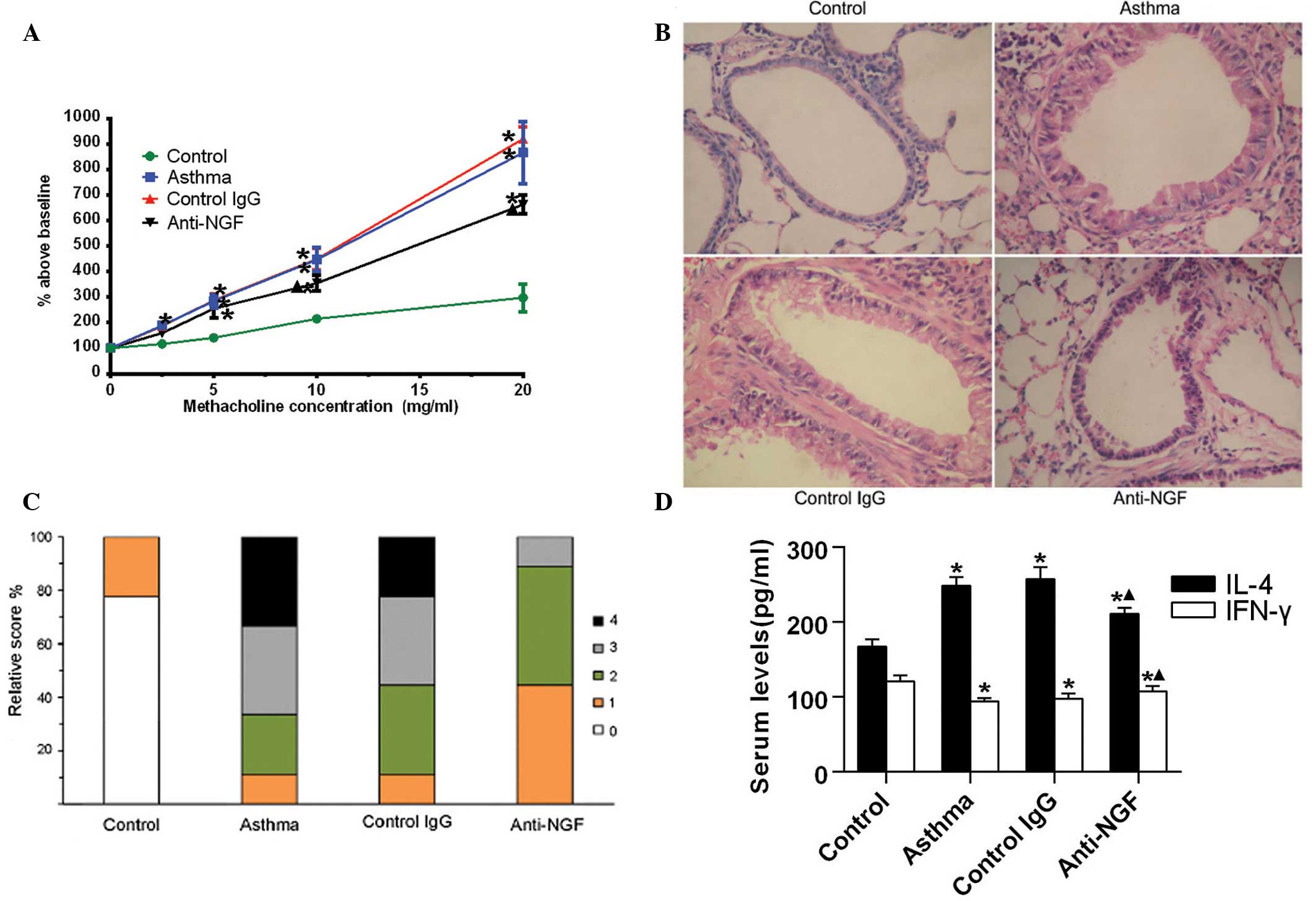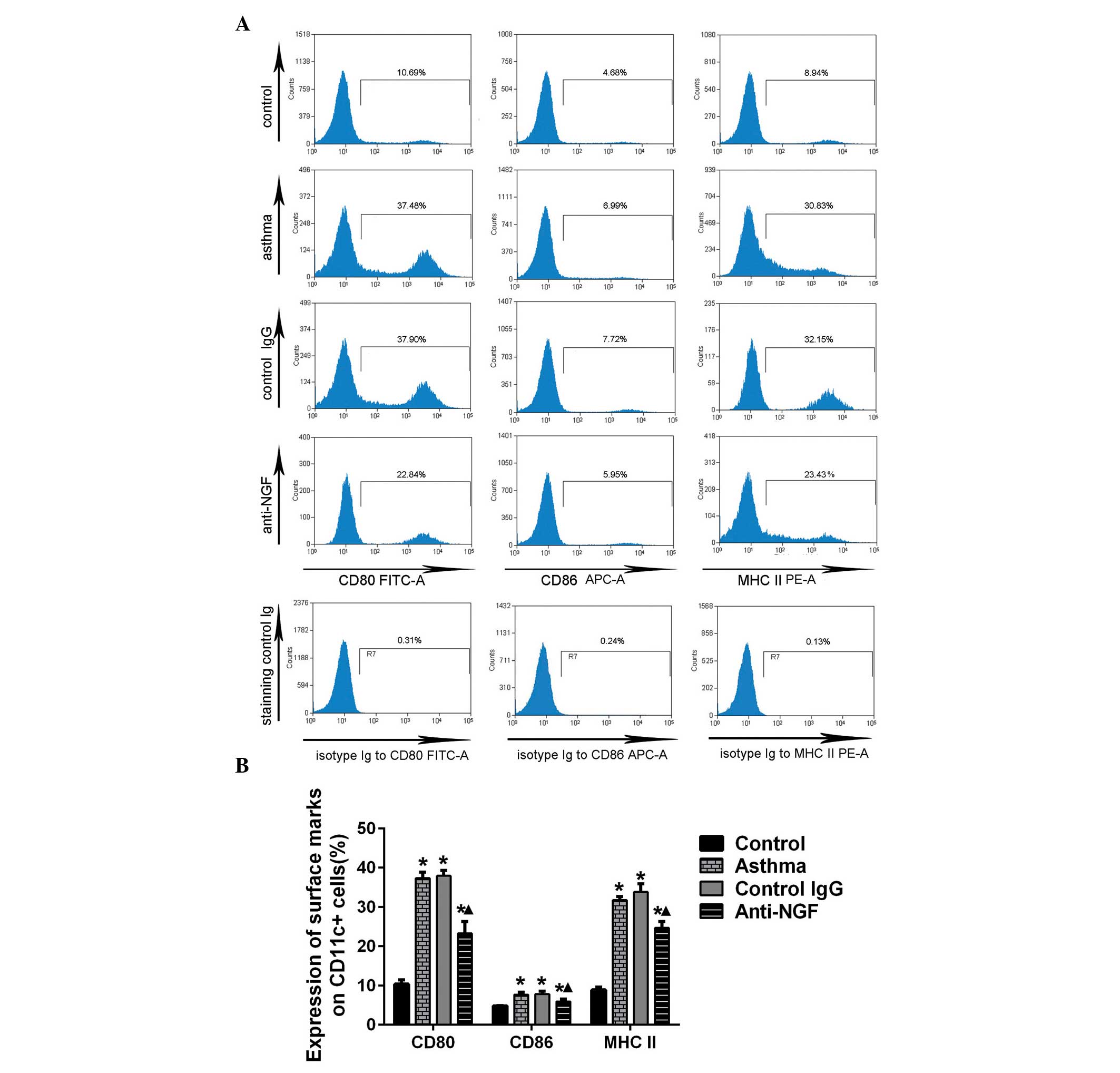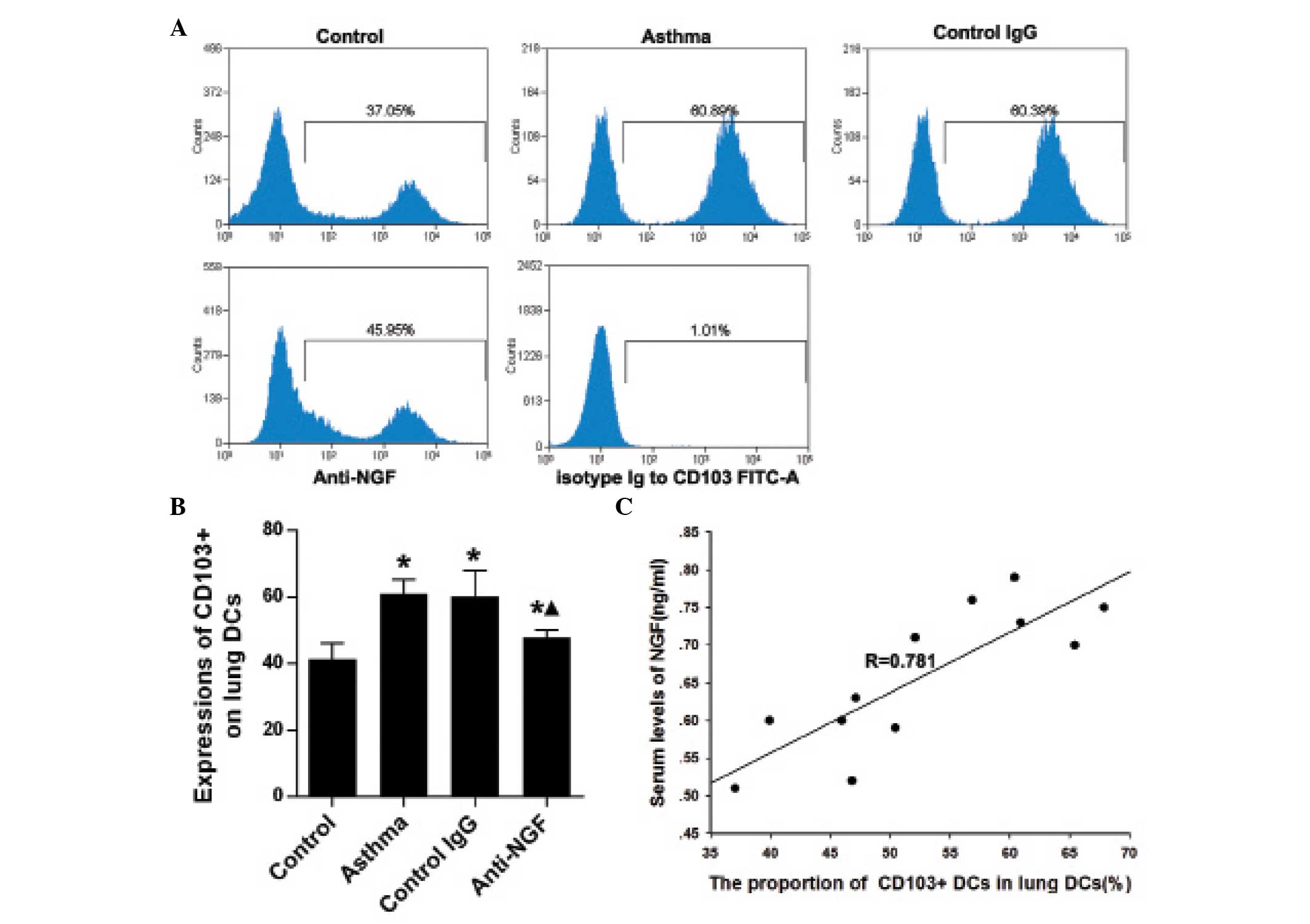|
1
|
Global Strategy for Asthma Management and
Prevention, Global Initiative for Asthma (GINA). 2012, http://www.ginasthma.org/documents/5/documents_variants/37uri.
Accessed December 30, 2012
|
|
2
|
Bosnjak B, Stelzmueller B, Erb KJ and
Epstein MM: Treatment of allergic asthma: modulation of Th2 cells
and their responses. Respir Res. 12:1142011. View Article : Google Scholar : PubMed/NCBI
|
|
3
|
Nassenstein C, Schulte-Herbruggen O, Renz
H and Braun A: Nerve growth factor: the central hub in the
development of allergic asthma? Eur J Pharmacol. 533:195–206. 2006.
View Article : Google Scholar : PubMed/NCBI
|
|
4
|
Päth G, Braun A, Meents N, Kerzel S,
Quarcoo D, Raap U, Hoyle GW, Nockher WA and Renz H: Augmentation of
allergic early-phase reaction by nerve growth factor. Am J Respir
Crit Care Med. 166:818–826. 2002.PubMed/NCBI
|
|
5
|
Chen YL, Huang HY, Lee CC and Chiang BL:
Small interfering RNA targeting nerve growth factor alleviates
allergic airway hyperresponsiveness. Mol Ther Nucleic Acids.
3:e1582014. View Article : Google Scholar : PubMed/NCBI
|
|
6
|
Braun A, Appel E, Baruch R, Herz U,
Botchkarev V, Paus R, Brodie C and Renz H: Role of nerve growth
factor in a mouse model of allergic airway inflammation and asthma.
Eur J Immunol. 28:3240–3251. 1998. View Article : Google Scholar : PubMed/NCBI
|
|
7
|
Shi Y, Jin Y, Guo W, Chen L, Liu C and Lv
X: Blockage of nerve growth factor modulates T cell responses and
inhibits allergic inflammation in a mouse model of asthma. Inflamm
Res. 61:1369–1378. 2012. View Article : Google Scholar : PubMed/NCBI
|
|
8
|
Lambrecht BN and Hammad H: Biology of lung
dendritic cells at the origin of asthma. Immunity. 31:412–424.
2009. View Article : Google Scholar : PubMed/NCBI
|
|
9
|
Willart MA and Hammad H: Alarming
dendritic cells for allergic sensitization. Allergol Int.
59:95–103. 2010. View Article : Google Scholar : PubMed/NCBI
|
|
10
|
van Rijt LS, Jung S, Kleinjan A, Vos N,
Willart M, Duez C, Hoogsteden HC and Lambrecht BN: In vivo
depletion of lung CD11c+ dendritic cells during allergen challenge
abrogates the characteristic features of asthma. J Exp Med.
201:981–991. 2005.PubMed/NCBI
|
|
11
|
Hammad H and Lambrecht BN: Dendritic cells
and airway epithelial cells at the interface between innate and
adaptive immune responses. Allergy. 66:579–587. 2011. View Article : Google Scholar : PubMed/NCBI
|
|
12
|
Seo JW, Cho SC, Park SJ, Lee EJ, Lee JH,
Han SS, Pyo BS, Park DH and Kim BH: 1′-Acetoxychavicol acetate
isolated from Alpinia galanga ameliorates ovalbumin-induced
asthma in mice. PLoS One. 8:e564472013.
|
|
13
|
Feng JT, Wu XM, Li XZ, Zou YQ, Qin L and
Hu CP: Transformation of adrenal medullary chromaffin cells
increases asthmatic susceptibility in pups from allergen-sensitized
rats. Respir Res. 13:992012. View Article : Google Scholar : PubMed/NCBI
|
|
14
|
He R, Feng J, Xun Q, Qin Q and Hu C:
High-intensity training induces EIB in rats through neuron
transdifferentiation of adrenal medulla chromaffin cells. Am J
Physiol Lung Cell Mol Physiol. 304:L602–L612. 2013. View Article : Google Scholar : PubMed/NCBI
|
|
15
|
Constabel H, Stankov MV, Hartwig C,
Tschernig T and Behrens GM: Impaired lung dendritic cell migration
and T cell stimulation induced by immunostimulatory
oligonucleotides contribute to reduced allergic airway
inflammation. J Immunol. 183:3443–3453. 2009. View Article : Google Scholar
|
|
16
|
Kushwah R and Hu J: Analysis of pulmonary
dendritic cell maturation and migration during allergic airway
inflammation. J Vis Exp. e40142012.PubMed/NCBI
|
|
17
|
Shao Z, Makinde TO, McGee HS, Wang X and
Agrawal DK: Fms-like tyrosine kinase 3 ligand regulates migratory
pattern and antigen uptake of lung dendritic cell subsets in a
murine model of allergic airway inflammation. J Immunol.
183:7531–7538. 2009. View Article : Google Scholar : PubMed/NCBI
|
|
18
|
Wegmann M: Th2 cells as targets for
therapeutic intervention in allergic bronchial asthma. Expert Rev
Mol Diagn. 9:85–100. 2009. View Article : Google Scholar : PubMed/NCBI
|
|
19
|
Kim JS, Kang JY, Ha JH, Lee HY, Kim SJ,
Kim SC, Ahn JH, Kwon SS, Kim YK and Lee SY: Expression of nerve
growth factor and matrix metallopeptidase-9/tissue inhibitor of
metalloproteinase-1 in asthmatic patients. J Asthma. 50:712–717.
2013. View Article : Google Scholar : PubMed/NCBI
|
|
20
|
Renz H and Kiliç A: Neurotrophins in
chronic allergic airway inflammation and remodeling. Chem Immunol
Allergy. 98:100–117. 2012. View Article : Google Scholar : PubMed/NCBI
|
|
21
|
Li QG, Wu XR, Li XZ, Yu J, Xia Y, Wang AP
and Wang J: Neural-endocrine mechanisms of respiratory syncytial
virus-associated asthma in a rat model. Genet Mol Res.
11:2780–2789. 2012. View Article : Google Scholar : PubMed/NCBI
|
|
22
|
Yang YG, Tian WM, Zhang H, Li M and Shang
YX: Nerve growth factor exacerbates allergic lung inflammation and
airway remodeling in a rat model of chronic asthma. Exp Ther Med.
6:1251–1258. 2013.PubMed/NCBI
|
|
23
|
de Vries A, Engels F, Henricks PA,
Leusink-Muis T, McGregor GP, Braun A, Groneberg DA, Dessing MC,
Nijkamp FP and Fischer A: Airway hyper-responsiveness in allergic
asthma in guinea-pigs is mediated by nerve growth factor via the
induction of substance P: a potential role for trkA. Clin Exp
Allergy. 36:1192–1200. 2006.PubMed/NCBI
|
|
24
|
von Garnier C and Nicod LP: Immunology
taught by lung dendritic cells. Swiss Med Wkly. 139:186–192.
2009.PubMed/NCBI
|
|
25
|
Noga O, Peiser M, Altenähr M, Knieling H,
Wanner R, Hanf G, Grosse R and Suttorp N: Differential activation
of dendritic cells by nerve growth factor and brain-derived
neurotrophic factor. Clin Exp Allergy. 37:1701–1708. 2007.
View Article : Google Scholar : PubMed/NCBI
|
|
26
|
Jiang Y, Chen G, Zheng Y, Lu L, Wu C,
Zhang Y, Liu Q and Cao X: TLR4 signaling induces functional nerve
growth factor receptor p75NTR on mouse dendritic cells via p38MAPK
and NF-kappa B pathways. Mol Immunol. 45:1557–1566. 2008.
View Article : Google Scholar : PubMed/NCBI
|
|
27
|
Xue M, Zhu L, Meng Y, Wang L, Sun H, Wang
F, Wang E and Shan F: Detailed modulation of phenotypes and
functions of bone marrow dendritic cells (BMDCs) by
interferon-gamma (IFN-γ). Int Immunopharmacol. 17:366–372.
2013.PubMed/NCBI
|
|
28
|
Nakano H, Free ME, Whitehead GS, Maruoka
S, Wilson RH, Nakano K and Cook DN: Pulmonary CD103(+) dendritic
cells prime Th2 responses to inhaled allergens. Mucosal Immunol.
5:53–65. 2012. View Article : Google Scholar : PubMed/NCBI
|


















